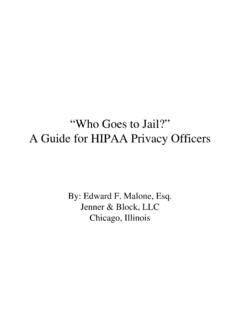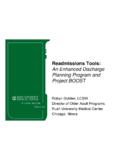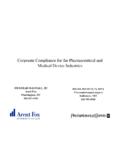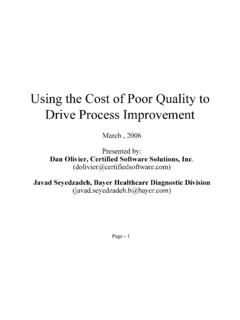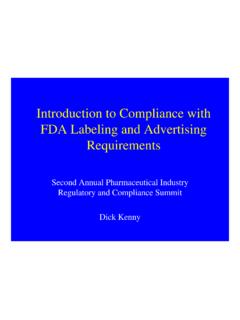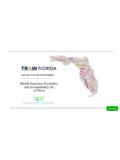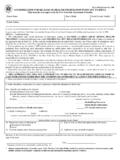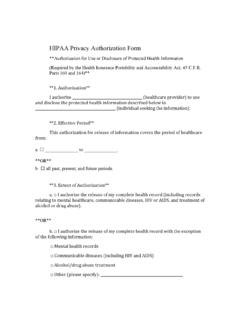Transcription of HIPAA Issues for Biotech and Life Science Companies: On ...
1 HIPAA Issues for Biotech and life Science companies : On the Frontier of Science and on the Edge of HIPAA . by Mark E. Schreiber 617-239-0585. and Patrick J. Concannon 617-239-0419. Introduction Most Biotech and life sciences companies are not directly covered by the Health Insurance Portability and Accountability Act of 1996 ( HIPAA ). Yet biotechs must collect and make use of de-identified or occasionally individually identifiable patient health data from clinical studies to sustain themselves, requiring that they work closely with HIPAA -covered entities. HIPAA 's standards are being imposed indirectly on Biotech , medical device and testing companies even where the companies are not covered entities or business associates under HIPAA , principally through clinical trial agreements ( CTA's ). Clinical researchers and research study sponsors increasingly need to be sensitive to and savvy about HIPAA standards that their partner researchers, physicians or health care providers live with day to day.
2 Are medical device companies covered entities? Medical device companies clearly can be HIPAA covered entities. Health care under HIPAA means care, services or supplies related to the health of an individual and includes, but is not limited to, preventative, diagnostic, therapeutic, rehabilitative, maintenance, or palliative care and counseling, service, assessment, or procedure with respect to the physical or mental condition, or functional status, of an individual or that affects the structure or function of the body and also sale or dispensing of a drug, device, equipment, or other item in accordance with a prescription. 1. A medical device company meets the HIPAA 's definition of health care provider if it is a provider of medical or health services (as defined in section 1861(s) of the Act, 42 1395x(s). See Appendix A for HHS' comments in the December 2000 Notice of Proposed Rulemaking about this definition.)
3 The definition of provider of medical or health services under 1861(s) is quite broad. The term medical and other health services means any of the following items or services (among others): 1. See 45 M A I N 6 1 7 . 2 3 9 . 0 1 0 0 F A X 6 1 7 . 2 2 7 . 4 4 2 0 w w w . p a l me r d o d g e . c o m (2)(C) diagnostic services which are . (i) furnished to an individual as an outpatient by a hospital or by others under arrangements with them made by a hospital, and (ii) ordinarily furnished by such a hospital (or by others under such arrangements) to its outpatients for the purpose of diagnostic study;. (2)(P) prostrate cancer screening tests;. (2)(R) colorectal cancer screening tests;. (13) screening mammography;. (14) screening pap smear; screening pelvic exam. The above-referenced sections of the definition may apply to certain medical device companies . The next question is whether a medical device company that is a health care provider, as defined, also transmits health information in certain electronic billing or claims transactions.
4 If so, such a medical device company may be a covered entity under HIPAA . Note that only one isolated billing email containing health information is required for a health care provider to trigger covered entity status. A relatively small number of device manufacturers bill for their equipment on a per use basis or submit Medicare or health insurance reimbursement claims electronically relating to such uses. Those that do are the most obvious candidates for medical device HIPAA -covered entities. Many medical device companies provide detailed training and servicing in connection with their products, and in the course of providing such services their employees may encounter individually identifiable health information, or protected health information ( PHI ). Some entities now are considering disabling the PHI access component of the device to limit HIPAA . exposure. Yet other medical device manufacturers will have summarily dismissed the question of possible HIPAA applicability based upon a belief that they do not engage in any electronic billing transactions; this conclusion may be reached without sufficient inquiry into the flow of PHI in the organization and the possibility that PHI is used for billing, claims or insurance purposes on occasion by their organization's accounts receivable group.
5 It is easy for the best intentioned regulatory team engaged in a HIPAA compliance assessment to inadvertently fail to ask, or have others ask, the right questions of the people in their organization, including in accounts receivable. Are medical device companies business associates? In some cases, yes. A small number of medical device manufactures may review the PHI of covered entities in the course of performing a quality review function listed under the business 2. associate definition in the HIPAA For example, a manufacturer of an imaging instrument might be called upon to review patient-specific images and provide feedback to the technician, physician or others at a HIPAA covered entity. Such device manufacturers may qualify as business associates under HIPAA . Additionally, where the business helps de-identify records or create a limited data set for a covered entity, these are recognized business associate functions.
6 For guidance as to when medical device companies are deemed covered entities or business associates, see the HHS FAQ Answer included at Appendix B. Are clinical study sponsors business associates under HIPAA ? Generally speaking, no. Sponsors and sponsors' contract research organizations ( CRO's ). typically do not perform any HIPAA -defined service functions or activities on behalf of the research facilities. Some research facilities will nonetheless refer to a study sponsor as a business associate and/or impose PHI handling obligations on sponsors in their standard CTA's that are tantamount to business associate agreement obligations. Research sites should require that sponsors agree to reasonable limitations on sponsors' use of study data. Sponsors should, however, strongly resist unnecessarily being characterized as a business associate or agreeing to overbroad or inapplicable PHI handling obligations similar to those of business associates.
7 Some sponsors hope to make use of study data for purposes other than research or scientific purposes, and resist provisions that tie their future use of study PHI to research or scientific purposes. A model letter from a CRO to a study site that explains that the CRO is not a business associate under HIPAA is included at Appendix C. Can a HIPAA authorization be drafted so as to authorize future specified research uses beyond the primary research study? The answer is no. HIPAA 's regulations require that research authorizations specify each purpose for the use and As it is virtually impossible at any given time to describe the purpose of a future, yet to be conceived study, an authorization form that purports to authorize the use and disclosure of PHI for future, unspecified research studies is likely to be HIPAA non- An exception is an authorization for PHI use in a registry or database for unspecified future research, which HHS indicates is acceptable.
8 2. Id. 3. See 45 (c)(iv). 4. For a useful discussion of the interplay between research facilities, investigators, and sponsors with respect to HIPAA . authorizations for clinical studies, see The Future Uses' Dilemma: Secondary Uses of Data and Materials by Researchers and Commercial Research Sponsors, by Mark Barnes & Kate Gallin Heffernan, BNA Medical Research Law & Policy Report, Vol. 3, No. 11, June 2, 2004, pp. 440-50. 3. Sponsors should pay close attention to appropriate HIPAA authorization language, as noted below, and also the drafting of CTA's. Sponsors are almost never HIPAA covered entities and thus generally need not comply with HIPAA standards upon receiving PHI pursuant to a valid HIPAA . authorization. The most significant limits on a sponsor's use of PHI from clinical studies are imposed by CTA's, including proposed uses and disclosures, and possibly exclusions for marketing purposes.
9 Sponsors should also be sufficiently familiar with state privacy laws that might impact the sponsors' future PHI usage options. Finally, it is obvious that a business associate agreement erroneously entered into between a facility and a sponsor can have a dramatic impact of the sponsor's ability to use and disclose PHI from a given study in the future. Should clinical study sponsors insist on having a say as to the contents of HIPAA . authorizations? The answer is yes. As mentioned above, study sponsors are generally not covered entities under HIPAA . Sponsors nonetheless have compelling interests in ensuring that authorizations used in clinical studies are HIPAA -compliant due to the sponsor's dependency upon the proper disclosure of the data resulting from studies. (It may not be in the sponsor's interests to push the envelope of excessively broad wording of HIPAA authorizations for this same reason.)
10 If months after authorizations were entered into by study participants in a given study, and after the study was underway, it was determined that the authorizations were HIPAA non-compliant, the sponsor likely could not or legally should not receive the participants' PHI under those circumstances. If the authorizations were determined to be defective only after the sponsor had received PHI from the study, the sponsor could face civil exposure if it were to use the Risks to sponsors aside, as a practical matter the sponsor is typically in a good position to anticipate the various classes of persons to whom PHI must be disclosed throughout the clinical process. Study sponsors should insist on representations and warranties in clinical trial agreements that sites will comply with HIPAA , obviously including HIPAA 's authorization requirements, and take a hands-on approach to ensure the required core elements in a study's authorization before participants begin to sign the authorizations.
